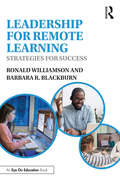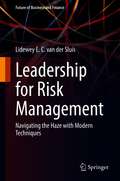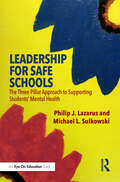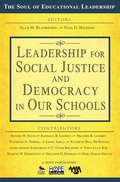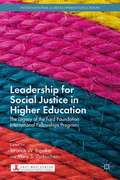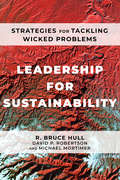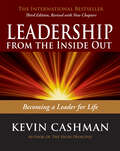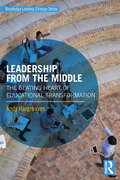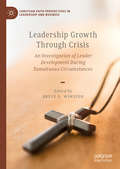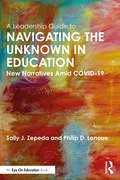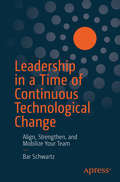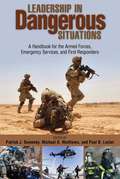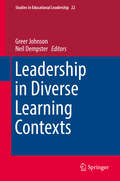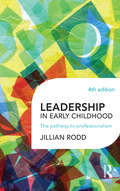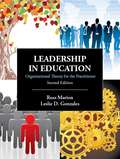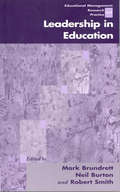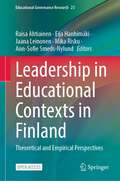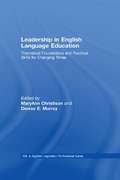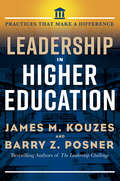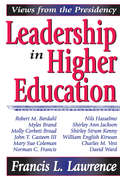- Table View
- List View
Leadership for Remote Learning: Strategies for Success
by Ronald Williamson Barbara R. BlackburnLearn how to adapt leadership and keep motivation alive in a remote learning setting or hybrid school. In this essential book, bestselling authors Ronald Williamson and Barbara R. Blackburn share frameworks and tools you can use to immediately make a difference in your school. You’ll learn how to do the following: Navigate the change process in remote learning Maintain a collaborative remote learning school Address equity issues in remote instruction Communicate effectively across online platforms Provide essential professional development remotely The chapter coverage ranges from school culture, to collaboration, to instructional leadership, to focusing on your own effective leadership. You will gain practical strategies and tips you can implement immediately to help your school and community flourish in a remote learning environment.
Leadership for Risk Management: Navigating the Haze with Modern Techniques (Future of Business and Finance)
by Lidewey E. van der SluisThe market is like the sea: it gives, and it takes away. That became apparent once again when the economy and society went into “lockdown” due to the coronavirus outbreak. Organizations will either sink or swim, and only the pros will be able to keep their heads above water.This is a self-help book for managers, supervisors and administrators who see themselves as skippers at the helm of an organization in times of turbulence, uncertainty and complexity. It provides a number of the latest handy management models, such as the Three-Phase Model, Governance Model and Management Matrix, which help leaders and managers arrive at well thought-out risk management decisions. In addition, the practical cases and discussion questions in each chapter help readers implement these models in their organizations. The book is an English translation of the Dutch book ‘Varen in de mist’, which was nominated for the Dutch Management Book of the Year.
Leadership for Safe Schools: The Three Pillar Approach to Supporting Students’ Mental Health
by Philip J. Lazarus Michael L. SulkowskiLeadership for Safe Schools is every school and district leader’s guide to developing practical policies and carefully designed action plans to ensure that K–12 students are physically and psychologically safe, secure, and supported. With today’s students experiencing soaring rates of depression, anxiety, trauma, loneliness, and suicidality—in addition to the effects of the COVID-19 pandemic and the normalization of school shootings—school personnel desperately need multifaceted approaches that decrease violence, facilitate social connectedness, and promote emotional well-being. This book’s proactive, preventive, and responsive Three Pillar Model offers a coherent framework for creating safe and supportive schools and fostering student mental health. Each chapter guides school leaders and administrators to implement evidence-based interventions and strategies, including: strategies for school safety, threat assessment, suicide prevention, and anti-violence efforts easy-to-apply improvements to school climate and culture social supports for diverse students, including the marginalized, victimized, and at-risk effective partnerships with families, communities, and other spheres of influence principles from positive psychology and social-emotional learning research-based strategies for trauma-informed care and crisis response Whether you are a principal or superintendent; a school psychologist, counselor, or social worker; or a school resource officer, nurse, or proactive teacher, this book will be your all-in-one inspiration for fostering resilient learning environments and implementing multi-component prevention and intervention strategies to support students’ mental health.
Leadership for Social Justice and Democracy in Our Schools
by Alan M. Blankstein Paul D. HoustonThis ninth and final book in The Soul of Educational Leadership series offers practical strategies for promoting socially responsible school cultures that enhance student engagement.
Leadership for Social Justice in Higher Education
by Terance W. Bigalke Mary S. ZurbuchenThis book provides a wealth of comparative information on social justice in higher education worldwide by examining how the Ford Foundation International Fellowships Program, the world's largest private fellowship program in higher education, has succeeded in fostering social justice leadership over the past ten years.
Leadership for Students
by Suzanne Bean Frances KarnesThe second edition of Leadership for Students: A Guide for Young Leaders explodes with positive ideas that will help students discover their leadership abilities. The activities throughout this book stimulate the exploration of ideas and encourage critical thinking about leadership. Students will find advice that emphasizes leadership skills in a variety of settings, including leadership in the classroom, school activities, and the community. Including real-life stories on how students took on leadership positions, this book is a must-read for anyone wanting to make a difference. The book includes a Leadership Action Journal that allows students to record their thoughts and actions as they develop their leadership skills. With exciting learning activities like conducting a survey on the characteristics of being a good leader, organizing a debate on leadership, interviewing community leaders, and developing and implementing a plan for becoming a leader, this is the essential leadership book for the 21st century.
Leadership for Students: A Guide for Young Leaders
by Frances A. Karnes Suzanne BeanThe second edition of Leadership for Students: A Guide for Young Leaders explodes with positive ideas and activities that will help your students discover their leadership abilities. The activities throughout this book stimulate the exploration of ideas and encourage critical thinking about leadership. Students will find guidance and advice that emphasize leadership skills in a variety of settings, including leadership in the classroom, school activities, and the community. Including real-life stories on how students took on leadership positions, this book is a must-read for anyone wanting to make a difference.The book includes a Leadership Action Journal that allows students to record their thoughts and actions as they develop their leadership skills. With exciting learning activities like conducting a survey on the characteristics of being a good leader, organizing a debate on leadership, interviewing community leaders, and developing and implementing a plan for becoming a leader, this is the essential leadership book for the 21st century.
Leadership for Sustainability: Strategies for Tackling Wicked Problems
by R. Bruce Hull David P. Robertson Michael MortimerSolving today's environmental and sustainability challenges requires more than expertise and technology. Effective solutions will require that we engage with other people, wrestle with difficult questions, and learn how to adapt and make confident decisions despite uncertainty. We need new approaches to leadership that empower professionals at all levels to tackle wicked problems and work towards sustainability. Leadership for Sustainability gives readers perspective and skills for promoting creative and collaborative solutions. Blending systems thinking approaches with leadership techniques, it offers dozens of strategies and specific practices, illustrated by inspiring case studies. Readers will come away with a holistic understanding of how to lead from where they are by applying leadership principles and practices to a wide range of wicked situations.
Leadership for the Future Sustainable Development of Business and Education: 2017 Prague Institute For Qualification Enhancement (prizk) And International Research Centre (irc) Scientific Cooperation International Conference (Springer Proceedings In Business And Economics)
by Wadim Strielkowski Oksana ChigishevaThis proceedings volume examines leadership from the perspectives of business, economics, social sciences, cross-cultural management, and education as a means to establish a future of sustainable development. Featuring contributions from the 2017 Prague Institute for Qualification Enhancement (PRIZK) and International Research Centre (IRC) “Scientific Cooperation” International Conference held in the Czech Republic, this volume focuses particularly on business models and higher education schemes from BRICS nations and examines topics such as social and educational practices, academic policies and business development. Leadership is becoming a key element for the future sustainable development of business and education in the quickly globalizing world. In this regard, a special emphasis should be made on the formation of high-quality human resources—the leading experts in their field who will create innovations and introduce breakthrough technologies. The development of a creative economy and knowledge economy requires highly-educated human capital, thus education becomes a key element of this process. Education must keep pace with time, be competitive, and stay in touch with the process of technology. The enclosed papers identify the key steps for sustainable growth and development in business and education. Featuring contributions on theory and practice, this book is appropriate for academics, researchers, policy-makers and practitioners in the areas of business, leadership management, entrepreneurship, innovation and education.
Leadership from the Inside Out: Becoming a Leader for Life
by Kevin CashmanGrow the Whole Person to Grow the Whole LeaderThis long-awaited third edition turns leadership development inside out for a new generation of authentic, purpose-inspired leaders. Balancing timeless principles with emerging research, this new edition offers:• Two new chapters: “Story Mastery” and “Coaching Mastery” • New case studies, stories, and exercises in every chapter• New validating research from the frontiers of leadership, neuroscience, psychology, and human potential• An even more powerful and transformative development experienceNow framed in eight profound and pragmatic “mastery areas,” this book serves as an integrated growth experience that helps leaders understand how to harness their authentic, value-creating influence and elevate their impact. Cashman demonstrates that his trademark “grow the whole person to grow the whole leader” approach, focusing on purpose-driven leadership, is even more relevant in today's hypercomplex world. For everyone from CEOs to emerging leaders, this new edition of a proven classic advances the art and science of leadership.
Leadership From the Middle: The Beating Heart of Educational Transformation (Routledge Leading Change Series)
by Andy HargreavesIn the face of a global pandemic, catastrophic weather events, war, racism, and attacks on democracy, how should educational leaders respond? How can leaders enable their schools and districts to be agile, safe, and effective places of learning that help young people develop the knowledge and character that will empower them to shape their futures? While some schools and districts have taken top-down or bottom-up approaches, renowned education scholar Andy Hargreaves explores a new type of leadership – "leadership from the middle" – which becomes a driver of transformational change. Drawing from research with educational leaders across the United States, United Kingdom, and Canada, Hargreaves discusses a type of leadership that regards obstacles as opportunities, embraces leadership paradox, and is collaborative, inspiring, and inclusive. This ground-breaking book unpacks not only what this type of leadership looks like, but also how it is most effective in addressing complex problems and in educating young people to develop diverse global competencies to prepare them for their futures.
Leadership Growth Through Crisis: An Investigation of Leader Development During Tumultuous Circumstances (Christian Faith Perspectives in Leadership and Business)
by Bruce E. WinstonThis edited collection uses a biblical lens to explore how to lead effectively and grow in a crisis situation. The chapters examine topics such as communicating through crisis, developing organizations and leaders through crisis, personal crisis and leadership development, and ethics and morality in crisis. Case studies include David's response to Goliath's challenge, Joseph's leadership and management of Egypt, and the team leadership and resilience of Esther and Mordecai in navigating a possible Jewish genocide.This book makes a unique contribution to the crisis leadership literature by examining the topic from a Christian perspective and will foster future research into the role of spirituality in organizational crisis.
A Leadership Guide for Women in Higher Education
by Marjorie HassWomen face unique challenges as they move into senior leadership roles at colleges and universities. This guide provides them with the frank, supportive advice they need to advance their careers and lead with excellence.For years, Marjorie Hass, now the president of Rhodes College, was approached by women in higher education looking for advice and support as they took on leadership roles and navigated challenging career paths. Eventually, she began offering online seminars so she could meet in small groups to answer questions and encourage women to develop mutually supportive relationships. In A Leadership Guide for Women in Higher Education, Hass draws on her sixteen years of senior leadership experience, her work with national higher education organizations, and her mentorship work with dozens of women to address fundamental issues women face when they lead in higher education.Aiming to level the playing field by giving women the insightful, supportive advice they need to advance in their careers and to lead with excellence, Hass combines practical information with career coaching. In this frank guide to launching, building, and advancing your academic career, Hass addresses a wide range of topics, including• deciding whether academic leadership is for you• developing a personal leadership style• becoming comfortable with power, ambition, and personal voice• navigating patriarchal assumptions• finding joy in leadership work• gaining experience with budget management, revenue generation, personnel management, and fund-raising—no matter your current job title• effectively managing conflict• aligning personal and career values and goals• winning your next job• and much moreWomen at any stage of their academic leadership career will find this guide insightful, useful, and empowering, as will anyone interested in supporting women leaders and diversifying leadership in higher education.
A Leadership Guide to Navigating the Unknown in Education: New Narratives Amid COVID-19
by Sally J. Zepeda Philip D. LanoueRecognizing that education systems have been temporarily paralyzed in the past and likely will in the future—whether it’s because of a natural disaster or a pandemic—this important volume offers critical insights about how schools can effectively carry forward the mission of educating all children even in the face of system turbulence and disruption. Featuring Narratives from expert leaders in urban, rural, and suburban school systems, this book explores important questions about the "new normal" such as the ways in which students can and should learn, how educators can teach and lead effectively, and how schools can carry out important functions beyond their instructional mission. Chapters present inspiring stories of leaders and teachers who have rallied, rebuilt, and problem-solved in face of the pandemic and amid adversity, ultimately providing a roadmap for how it’s possible to rebuild and adjust while preserving the fundamental core of education. Full of takeaways and first-hand insights into how systems and their schools faced turbulence, disruption, and adaptation, this book is a must-read for today’s educators committed to making a positive impact on the students they have the duty to serve.
Leadership in a Time of Continuous Technological Change: Align, Strengthen, and Mobilize Your Team
by Bar SchwartzDigital technology is rapidly challenging the way we do business, interact with our communities, and learn about the world. Due to this, leading change in your digital organization now comes with unprecedented tools and platforms to make your teams the most effective they can be. Leadership in a Time of Continuous Technological Change has arrived at this pivotal moment and is your roadmap for this exciting, evolving journey. Author Bar Schwartz introduces a holistic framework for leaders to take the reins in the digital Wild West. Achieving your team’s goals in this new environment will require high creativity, an entrepreneurial mindset, and a diversity of perspectives to solve problems that have never before been tackled. Roles and responsibilities have morphed, and what made you successful in the past may no longer apply. Leadership in a Time of Continuous Technological Change is an unmatched resource fit for our new decade. Through analyzing detailed case studies, you will see how understanding your identity paves the way to achieving emancipation, capability, and autonomy. Ultimately, you will be empowered to lead with clarity. Your team has everything they need to excel. Discover how alignment and clarity can support you in launching your team to new heights.What You Will LearnExamine case studies of different situations that can arise within a team and go through lists of takeaway questions that leaders can start asking to gain quick winsAdopt an agile mindset while taking into consideration the existing culture in the organizationCommunicate and align on expectations and goals with your team in a time of organizational change Who This Book Is ForEmerging leaders who are dealing with change or leading change and seek to increase the level of alignment and clarity for their people and themselves
Leadership in America's Best Urban Schools
by Cynthia L. Uline Joseph F. Johnson, Jr. Lynne G. PerezLeadership in America’s Best Urban Schools describes and demystifies the qualities that successful leaders rely on to make a difference at all levels of urban school leadership. Grounded in research, this volume reveals the multiple challenges that real urban elementary, middle, and high schools face as well as the catalysts for improvement. This insightful resource explores the critical leadership characteristics found in high-performing urban schools and gives leaders the tools to move their schools to higher levels of achievement for all students—but especially for those who are low-income, English-language learners, and from various racial and ethnic backgrounds. In shining a light on the essential qualities for exceptional leadership at all levels of urban schools, this book is a valuable guide for all educators and administrators to nurture, influence, support, and sustain excellence and equity at their schools.
Leadership in Dangerous Situations
by Michael D. Matthews Patrick Sweeney Paul B. LesterLeadership in Dangerous Situations provides in-depth coverage of the key psychological, social and organization factors that impact individual and organizational effectiveness for First Responders in dangerous environments. Leading scholars discuss how current theories and empirical research provides guidelines to help solve the challenges leaders are likely to face in dangerous contexts. This book is directed to First Responders leaders from the Military, Law Enforcement, Fire, Emergency Services and Not-for profit agencies working in dangerous areas. The purpose of this book is to assist the First Responders who risk their lives to serve the public, to prepare for the unique challenges of leading and operating in dangerous situations. Dangerous situations are environments where group members must routinely engage in events that place their physical and psychological well-being at risk to accomplish the organization's objectives. International scholars and practitioners from the military, law enforcement, fire and rescue, teamed together to address the unique challenges facing dangerous context leaders. Each chapter integrates theory and research with practical experience to address the various challenges these leaders will face while operating in dangerous situations. The intent is to provide practitioners an easily understandable guide, backed by scholarly findings, to prepare themselves and their organizations for the unique psychological, social, and physical challenges of leading and operating in dangerous contexts. The blending of theory and empirical research with practical experience clearly illustrates the principles of effective leadership in dangerous contexts Whether one is a young leader preparing for war, a seasoned commander with multiple combat tours, a Special Weapons and Tactics (SWAT) team leader, Emergency Medical Technician (EMT) supervisor, first line supervisor of a law enforcement patrol unit, or a lieutenant responsible for a shift of firemen, the challenges of leading people in contexts where life and death decisions are common are very similar. The purpose here is to provide the leader with a better understanding of what is required to lead in dangerous contexts. The contributing authors delve into the psychological, social, and physical factors that can impact the ability to lead, the ability of personnel to perform, and the organization's ability to accomplish the mission. In the end, the leader will take away not only a understanding of how leading in dangerous contexts is different than leading in contexts where lives are not on the line, but also gain a deeper understanding of why it differs, where commonalities occur, and - perhaps more importantly - how to prepare leaders, whether military or civilian to guide their first responder organizations to perform successfully in dangerous situations.
Leadership in Diverse Learning Contexts
by Greer Johnson Neil DempsterThis book presents the outcomes of research and practical endeavour in some of the diverse contexts in which learning takes place: classrooms, schools, professional development settings, community projects and service sector agencies. It invites the reader to engage with two related questions of contemporary concern in the leadership field: "What can we learn about the important influence of different contexts on leadership practice and how are people brought together as collective human agents in different patterns of distributive leadership?" In doing so, this collection emphasises three of the critical concepts at play when leadership is viewed, not as position, but as activity. The three concepts are purpose, context and human agency. When this view of leadership is understood, it is always about achieving shared goals with people power, no matter the circumstances in which they are gathered together.
Leadership in Early Childhood: The pathway to professionalism
by Jillian Rodd'Essential reading and a powerful tool for emerging early childhood leaders.' - Catharine Hydon, Early Childhood ConsultantWith increasing community insistence for quality and accountability in early childhood education and care, there is a need for effective and professional leadership in these services. Leadership in Early Childhood is a practical resource for early childhood practitioners who want to understand how to create and sustain successful childcare and early education settings.Fully revised and updated, this fourth edition is divided into three sections: deconstructing leadership; leadership in practice; and special responsibilities of early childhood leaders. This edition also includes new case studies, an additional chapter summarising the key contributing factors to effective leadership and examples based on an extensive international study of early childhood leaders.Leadership in Early Childhood has been widely used in early childhood education programs and as a professional reference text and remains a valuable resource for both students and professionals.
Leadership In Education: Organizational Theory For The Practitioner
by Russ Marion Leslie D. GonzalesLeadership in Education: Organizational Theory for the Practitioner
Leadership in Education: From The Top Down And The Bottom Up (Centre for Educational Leadership and Management)
by Robert Smith Neil Burton Mark Brundrett`Leadership in education is receiving increasing attention, and this text contributes much to the debate. A useful text that will appeal to a wide audience of senior managers, teachers, programme designers and researchers' - Learning and Skills Research `If one were on a fact-finding mission to gain insight into leadership thought and practice in education, then this book is an excellent resource' - Education News `This book makes an excellent contribution to the current debate on Educational Leadership. It blends theory with practice and provides an important resource for many aspects of leadership development programmes at a variety of levels. The book will appeal to the academic reader, the postgraduate student and those involved in providing leadership courses at a professional level. There is an international perspective on the analysis of leadership theory and practice, integrating examples from a variety of cultural settings and exploring education at all phases from primary to higher' - Stephen Merrill, Edge Hill College of Higher Education, Journal of In-Service Education `Leadership in Education offers an excellent analysis of the current debate: well informed on research and practice, positive but critical. It is particularly strong on what it calls "the railway-bookstall offerings of context-independent leadership".... There is a great deal of practical wisdom within these very accessible pages' - Michael Duffy, Times Educational Supplement This book deals with leadership in all sectors, from primary to higher education. It presents an international perspective on the analysis of leadership theory and practice, with the integration of exemplars from different cultural settings. The authors provide a wide range of conceptual perspectives on leadership. Themes include: - the efficacy of centralized versus distributed concepts of leadership - the contrast between competency and academic models of leadership development - the contradistinction between functionalist and democratic models of leadership. These themes are developed in four sections: - Conceptualization - Leadership development - Teachers as leaders - Leadership in practice Contributors include: Clive Dimmock, Peter Gronn, Marianne Coleman, Peter Ribbins, Ray Bolam, Peter Newton, Kenneth Leithwood, Helen Gunter, Lynn Davis, Clive Harber and Graham Peeke This book is recommended to all involved in educational management, particularly to students, teachers, researchers, policy makers and educational administrators. The Centre for Educational Leadership and Management series, edited by Tony Bush, examines the impact of the many changes in the management of schools and colleges, drawing on empirical evidence. The approach if analytical rather than descriptive and generates conclusions about the most effective ways of managing schools on the basis of research evidence.
Leadership in Educational Contexts in Finland: Theoretical and Empirical Perspectives (Educational Governance Research #23)
by Raisa Ahtiainen Eija Hanhimäki Jaana Leinonen Mika Risku Ann-Sofie Smeds-NylundThis open access book provides a comprehensive overview and in-depth coverage of contemporary aspects of leadership in the field of education in Finland. It brings together Finnish scholars to critically explore and discuss leadership in education in the context of the Finnish education system and in relation to international discourses around the topic. It discusses the phenomenon of leadership in educational contexts through several novel empirical and theoretical research designs. It includes themes such as distributed leadership and collaborative governance, changing aspects in the leadership profession, and contradictions in everyday organizational practices and realities. The work also combines conceptual discussions in educational and pedagogical leadership to analyze and to clarify the theoretical and conceptual multidimensionality and ambiguities.
Leadership in English Language Education: Theoretical Foundations and Practical Skills for Changing Times (ESL & Applied Linguistics Professional Series)
by MaryAnn Christison Denise E. MurrayLeadership in English Language Education: Theoretical Foundations and Practical Skills for Changing Times presents both theoretical approaches to leadership and practical skills leaders in English language education need to be effective. Discussing practical skills in detail, and providing readers with the opportunity to acquire new skills and apply them in their own contexts, the text is organized around three themes: The roles and characteristics of leaders Skills for leading ELT leadership in practice Leadership theories and approaches from business and industry are applied to and conclusions are drawn for English language teaching in a variety of organizational contexts, including intensive English programs in English-speaking countries, TESOL departments in universities, ESL programs in community colleges, EFL departments in non-English speaking countries, adult education programs, and commercial ELT centers and schools around the world. This is an essential resource for all administrators, teachers, academics, and teacher candidates in English language education.
Leadership in Higher Education: Practices That Make A Difference
by Jim Kouzes Barry PosnerThe authors of the classic bestseller The Leadership Challenge bring their expertise to higher education, offering five practices that can make any college or university leader into an exemplary leader. Drawing on the same pioneering research that formed the foundation of their classic bestseller The Leadership Challenge (over 2.7 million copies sold), James Kouzes and Barry Posner offer a set of leadership skills and practices that will make a significant difference in every area of higher education—faculty, administration, library services, career counseling, auxiliary services, campus safety, and more. It's about the behaviors that leaders, regardless of their position, use to transform values into actions, visions into realities, obstacles into innovations, segments into solidarity, and risks into rewards. Kouzes and Posner tell the leadership story from the inside and move outward, describing it first as a personal journey and then as mobilizing others to want to do things they have never done before. The Five Practices of Exemplary Leadership is the operating system for this adventure. Leadership in Higher Education explains the fundamental principles that support these practices and provides case examples of people in higher education who demonstrate each one. A core theme that weaves its way through all the chapters is that, whether it's one to one or one to many, leadership is a relationship between those who aspire to lead and those who choose to follow. We need leaders who can unite us and ignite us. This book lights the way.
Leadership in Higher Education: Views from the Presidency
by Francis L. LawrenceIn this collection of interviews, presidents and chancellors of some of America's most respected universities candidly reflect on their experiences during the decade leading up to the twenty-first century and immediately following it. This was a time of change and uncertainty, when opportunities for achievement and potential for failure made their role uncommonly challenging, and success called for considerable determination, integrity, foresight, skill, and courage.The American higher education system, often characterized as the best in the world, is distinguished for its scholarship as well as its accessibility. Its indispensable role as an engine for individual and societal economic advancement has made universities the targets of media interest, critical examination, and political manipulation. Higher education has become the passport to the American dream, and the percentage of those going to college has increased, challenging individual institutions and systems to accommodate growing numbers of aspiring students while searching for solutions to problems of inadequate college preparation and inadequate financial assistance for low-income students. Despite their increasing importance to the nation, the region, and their communities, public and private universities have seen states reduce their support to their state systems of higher education, shifting the responsibility to individuals and institutions.Leadership in Higher Education traces the careers of thirteen women and men who have presided over a total of twenty universities or university systems and three national organizations of higher education: Robert Berdahl, Myles Brand, Molly Corbett Broad, John T. Casteen III, Mary Sue Coleman, Norman C. Francis, Nils Hasselmo, Shirley Ann Jackson, Shirley Strum Kenny, William English Kirwan, Francis L. Lawrence, Charles M. Vest, and David Ward.
